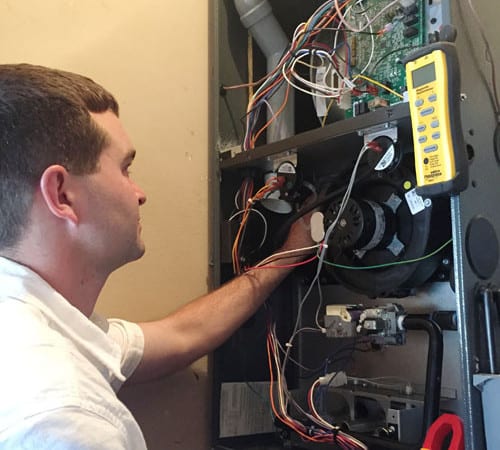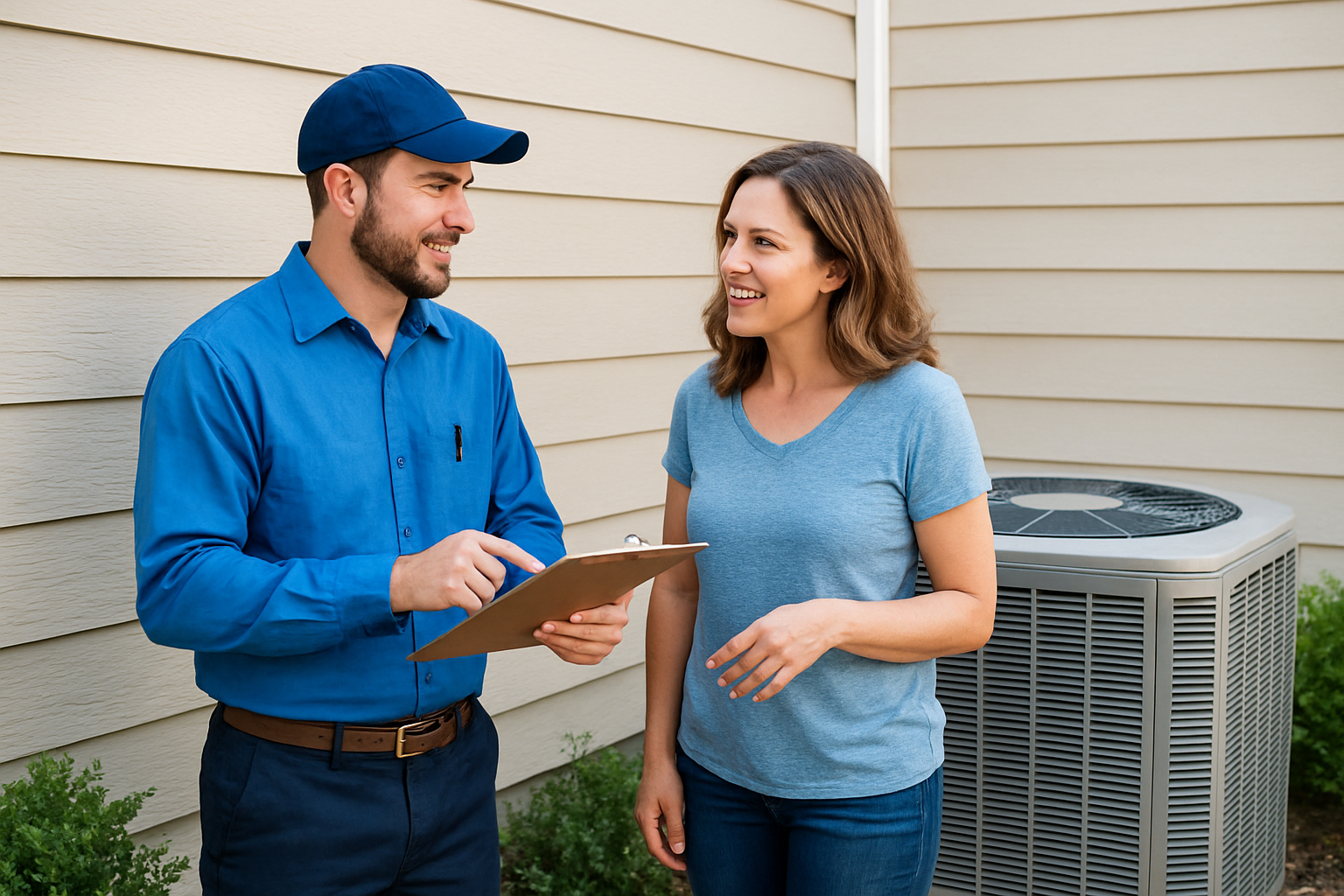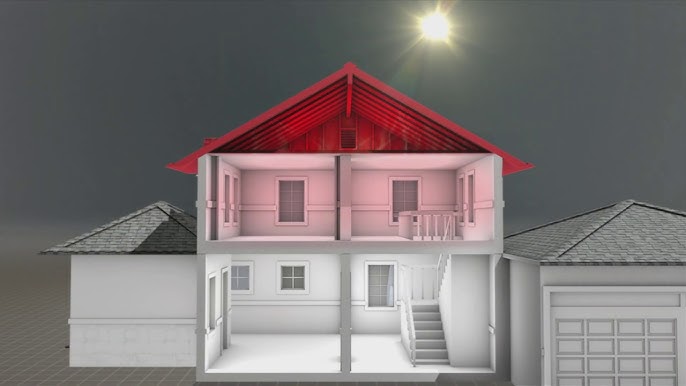
House fires are more likely to occur in the wintertime as we spend more time indoors, with electricity running and furnace most likely to be in use. In fact, two of the leading causes for house fires are heating or electrical systems. As winter approaches, it is important for homeowners to understand some things about their electrical and heating systems and take a proactive approach to your home’s safety. At LA Construction, Heating and Air we care about your safety. In this article we will discuss some of the most common unsafe heating scenarios and some heating safety tips to help avoid fire hazards this winter.
Neglecting Routine Furnace Maintenance
The first step in preventing furnace- caused home fires is to schedule furnace maintenance. Furnaces can become dangerous if not properly inspected. Professional routine maintenance can catch issues with your HVAC early before they cause unexpected breakdowns and costly furnace repairs. Technicians will inspect critical furnace components such as burners and heat exchanger and alert you if any issues require further attention. If any worn-out parts need replacement its best to get it done to maintain safety, efficiency and keep your system from overheating. It is best to schedule furnace maintenance at least once a year for the best results.
CO Detectors Not Being Tested
Carbon monoxide is dangerous to breathe but is also highly flammable. It is extremely important for carbon monoxide detectors to be tested for safety. If you do not already have one, install a carbon monoxide detector near the HVAC. CO is odorless and colorless and can build up to dangerous levels from inadequate ventilation and malfunctioning appliances. In case of a buildup the CO alarm will give you an early warning. CO detectors have a test button that makes a sound if the battery is working. Depending on the manufacturer some may require monthly testing.
Not Testing Smoke Detectors
Like with CO detectors, unfortunately many homeowners forget to check smoke alarms to ensure they are operational. Make it a habit to check your alarms every month especially during the winter months when your furnace is in use. Testing smoke alarms and replacing batteries as needed is a valuable first line of defense in case of a fire. Most smoke alarms have an average lifespan of ten years, slightly longer than a CO detector. Ensuring that all fire safety devices are operational can provide you and your family with added protection year-round.
Damaged Electrical Cords
Loose or worn wires are more likely to cause overheating and is the most common HVAC fire hazard. Overtime wiring can become loose due to HVAC equipment vibration. They can generate a great amount of heat which in turn may damage or burn wiring insulation. This can result in exposed wiring that can short circuit. Be sure to check your extension cords also. If the protective coating is damaged or cracked replace the extension cord.
Overloaded Outlets
As a safety measure overloaded outlets will usually trip a breaker when a high current level is detected. However, if the break malfunctions it can lead to fire hazards. Check to ensure that the outlets are not overloaded.
Doing DIY Repairs
Don’t do it yourself, it is essential to maintain furnace safety that furnace repairs are completed by professionals. Modern furnaces often use electronic ignition systems that can carry high voltages and may cause significant injury to non-professionals. Attempting to complete furnace repairs without the proper knowledge and training can cause bigger problems such as further damaging furnace components turning a minor problem into a major repair expense or furnace replacement. Not only that but it could result in dangerous conditions for your home such as high levels of carbon monoxide, fire hazards, and high energy bills.
No Proper Furnace Ventilation
It is important to keep your furnace vents clear. Dangerous furnace fumes such as carbon monoxide exit your home through the flue pipe in your roof. Regularly inspect this vent for leaves and small animals such as birds to ensure the vent is clear to prevent gases from backing up in your home. It is also important to keep the interior vents clear of furniture, curtains, and other items that can block airflow. Also keep in mind that depending on what is blocking the vent, the material can potentially get too hot and become a fire risk.
Cluttered Furnace Area
Keep the area surrounding your furnace clear of clutter. The NFPA recommends leaving a 3-foot buffer space between your furnace and flammable materials. The unit can get hot during operation and any flammable materials that are near or leaning on the unit are at risk of catching fire. These items include boxes, cleaning supplies, paper, wood, or other items in close vicinity of the furnace. Additionally keeping the furnace area clear of clutter provides easy access for filter replacement and routine HVAC maintenance.
Space Heaters
Most fires caused by space heaters occur because they are placed too close to combustible objects, such bedding, furniture, or curtains. Space heaters should be placed a minimum of three feet away from anything flammable and be turned off when you leave the room or go to sleep and unplugged when you leave the home. Also be mindful of keeping children and pets away from them.
Damaged Heat Exchanger
The heat exchanger is responsible for transferring heated air into the ducts and vents that carry it out into your home. Cracks form in the unit over time and can be difficult to spot. These cracks allow for carbon monoxide and other gases into the home, which are not only toxic but a fire hazard as well.
Holiday Decorations
Avoid placing decorations near space heaters, furnace vents, fireplaces and anywhere they could cause a fire hazard. Also be sure to keep your tree away from heat generating appliances and turn off lights when leaving your home or going to sleep.
Contact LA Construction, Heating and Air
Most importantly have a fire extinguisher in your home and know how to use it in case of emergency. Store them in rooms at higher risk of fire such as the kitchen and garage. HVAC systems can result in fires, but with proper care and maintenance you can reduce the risk. We hope this heating safety tips will ensure you and your loved ones have a safe and warm winter. If you would like to schedule furnace repair or furnace maintenance give us a call today or contact us online, we are here to help.
Heating Safety Tips to Follow This Winter Related Posts:











































